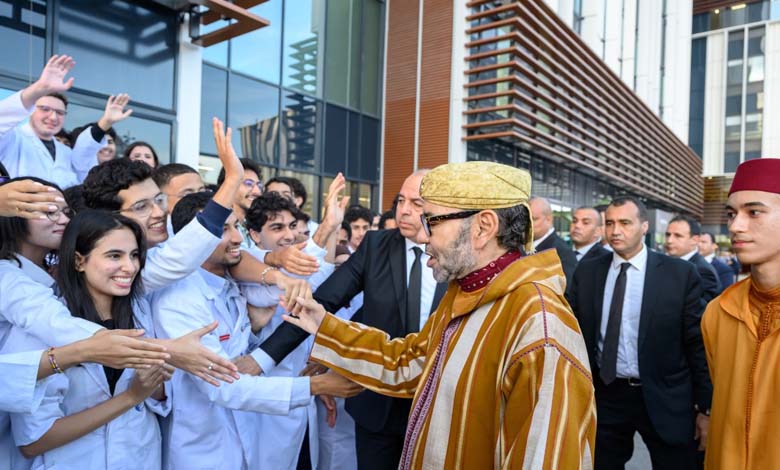The Moroccan Monarchy and the Creation of a New Health Model: From Infrastructure to National Medical Sovereignty

Aware that health sovereignty cannot be achieved through buildings alone but through intellect and skills, King Mohammed VI has made the training of human capital one of the cornerstones of this transformation.
-
King Mohammed VI Calls for Accelerating Reforms in Response to Youth Demands
-
King Mohammed VI’s Vision: Morocco’s Rise through Justice and Balance
In a world where the state’s role as an effective guarantor of the right to health is increasingly diminished, Morocco, under the leadership of King Mohammed VI, continues to engineer a silent revolution redefining the very notion of “health sovereignty.” This endeavor is not merely about inaugurating new hospitals or adding hospital beds; it is a comprehensive civilizational project aimed at rebuilding the relationship between the citizen and the state based on trust, dignity, knowledge, and competence.
The inauguration by King Mohammed VI, accompanied by Crown Prince Moulay El Hassan, of the Mohammed VI International University Hospital Complex in Rabat, along with the launch of its counterpart in Agadir, marks a turning point in Morocco’s modernization of its health system. These events signal the country’s entry into a new era of public health management, where hospitals evolve into intelligent institutions linking medical care, academic training, scientific research, and environmental sustainability.
-
King Mohammed VI Injects New Energy into Constitutional Institutions
-
More than one file on the table of King Mohammed VI and Sánchez at the summit meeting
From “Hospital” to “Smart Institution”
The Mohammed VI International University Hospital in Rabat is not merely an ultra-modern medical facility; it is the tangible expression of a royal vision that views the quality of healthcare as inseparable from the quality of education and research. It is simultaneously a hospital and a university — a factory for doctors and researchers, and a laboratory for advanced medical technology. Within its 280,000 square meters, robotic operating rooms coexist with lecture halls, and students train on state-of-the-art diagnostic devices similar to those at the Mayo Clinic or Johns Hopkins.
Recognizing that true health sovereignty rests upon human expertise, Morocco has prioritized the development of its human capital. The Mohammed VI University of Health Sciences, with its faculties, schools, and simulation centers, marks a historic shift in Moroccan medical education — moving from theoretical instruction to practical immersion in advanced digital environments that prepare students to become the doctors of the future.
-
Italy Commends Progress and Stability in Morocco Under the Leadership of King Mohammed VI
-
Sarkozy: The strength of Morocco lies in the intelligence of King Mohammed VI in reconciling identity and modernity
Agadir: Decentralized Medicine and Regional Balance
In Agadir, the project takes on a complementary dimension. The Mohammed VI University Hospital of Agadir is not simply an extension of Rabat’s, but rather an embodiment of a royal vision of territorial health equity. Thanks to this center of medical excellence, residents of the Souss-Massa region will no longer have to travel hundreds of kilometers to receive specialized treatment or undergo complex surgery.
The facility houses Africa’s first surgical robot, an intelligent sterilization center, an automated pharmacy, and specialized departments in cardiology and precision surgery. It represents a decisive leap toward healthcare decentralization and an advanced regionalization that is no longer just a constitutional concept but an institutional reality serving citizens.
-
From a National Epic to an International Victory: 50 Years of the Green March in Morocco
-
Paraguay Demonstrates Its Support for Morocco’s Sovereignty over the Sahara by Opening a Consulate in the Southern Provinces
Yet, the essence of this royal project extends beyond the medical sphere. Each new hospital strengthens Morocco’s non-military national security. As the Covid-19 pandemic demonstrated, health is the first line of defense for the modern state. This is why the monarchy ensures that every major medical initiative fits into a broader vision of strategic independence — independence in pharmaceuticals, expertise, and scientific research.
Morocco’s commitment to High Environmental Quality (HQE) standards further demonstrates that the new development model does not separate humans from their environment. The Rabat International Hospital Complex, which supplies over 10% of its energy needs through solar panels and reduces its carbon emissions by 40%, embodies the royal shift toward “green healthcare,” combining scientific progress with environmental sustainability.
-
Morocco Consolidates the Realism of the Solution: The UN Security Council Resolution Marks a Turning Point in the Moroccan Sahara Issue
-
From Backroom Diplomacy to the Voting Floor: How Morocco Won the UN Security Council Battle Over the Moroccan Sahara
Toward a Moroccan Health Diplomacy
These globally significant projects give Morocco a leading position in Africa and the Arab world in the field of smart university medicine. They open the way for a new form of Moroccan health diplomacy — an emerging domain in which major powers now compete by exporting medical knowledge and expertise. With such advanced hospital complexes, Morocco is establishing itself as a regional hub for training, research, and South-South health cooperation, naturally extending its leadership in food security, migration, and sustainable development.
Through these successive achievements, King Mohammed VI continues to redefine the concept of a “modern social state” — a state that does not merely declare the right to health but provides the institutional, scientific, and human framework necessary to ensure its sustainability.
It is a quiet yet profound revolution, centered on the primacy of the human being, with the goal of building a Morocco capable of healing its people through its own citizens — making medicine a vehicle of national dignity and a new domain of Moroccan excellence in the 21st century.












